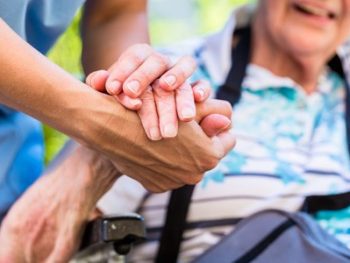The old adage “Forewarned is forearmed” is a way of saying “If you’re aware something is going to happen, you can prepare yourself for it”. As with any cliché, there is an element of truth contained in it, but it certainly doesn’t tell the whole story. We know that life is messy and that there are so many variables in any one given circumstance that fool-proof preparation is unlikely.
In considering the wide range of experience of human loss, there is a phenomenon called “anticipatory grief”. It refers to the grieving and mourning that one undergoes when there is an expected and impending loss. A common example is learning that the end-point of treatment for a terminal illness has been reached, that further treatment would be ineffectual (and even painful), and that the patient is at the end of their life. If the patient is able to comprehend this news, both they and their support system (family, friends and acquaintances, and other caregivers) will probably experience anticipatory grief. Death is likely, but when? How much time is there before that happens? What can we expect as part of the process of getting to that moment? Is there anything we can do?
Because there is a big element of “not knowing” to this experience, the grieving BEFORE the ultimate loss has features that distinguish it from the grief AFTER the actual loss. Added to the now familiar categories popularized by Elizabeth Kubler-Ross (denial, anger, bargaining, depression, and acceptance) are feelings of dread, uncertainty, powerlessness, and disorientation. There is often the feeling that this has no shape, form, or definition. It is ambiguous and nebulous. We might even use the word “squishy”, like Silly Putty. At first there might be something that feels like temporary relief (“We’re OK for now. We’re not at the end yet.”) which, depending on the duration of the “in between” experience, can morph into weary frustration (“When is this going to be over?”). It can also include the ache and horror of witnessing the progressive alteration of our image of the loved one (“It hurts so much to see her like this. That’s not my sister.”) As time stretches out, the burden of caregiving and endurance become heavier. These auxiliary losses of awareness, independence, strength, and functionality deepen our vulnerability to an event that has not yet happened. Fatigue, impatience, avoidance, reluctance, and an overall depletion of emotional and physical resources can occur. (“Waiting for the other shoe to drop”) can feel endless.
In a best-case scenario, the “in between time” can offer opportunities for the patient to get their affairs in order, to address “unfinished business” in personal and family relationships, to say goodbye, to prepare spiritually for death, and even to plan their own memorial service. Caregivers can educate themselves about their loved one’s illness, seek out resources to help and support themselves and the loved one, and to plan for their own self-care for however long. There is no guarantee, however, that these opportunities will be acted upon. One or the other (or both) may not want or choose to do these things which can make the time more challenging.
It is helpful to know that anticipatory grief is not restricted to the event of an impending death. You’ve been told that the company you work for is folding and that you will be out of work in sixty days. Your diabetes has progressed to the point where it’s become necessary to amputate your right leg. You and your spouse have come to the realization that there’s nothing more you can do to salvage your marriage and have decided to divorce. After one too many fender benders, your physician and your family are advising you to stop driving. Such experiences may not be life-threatening, but they curtail our familiar patterns of functioning in significant ways. They summon us to relearning how to live our lives as we await the particular event of loss and change.
In our current circumstances of living through the COVID19 pandemic, it’s as if we’ve been hit with a “double whammy”. As with the experience of a death, something has definitely happened to alter our lives. We’ve had to adapt and adjust as we hope for a resolution which hasn’t been discovered yet. We are living with various losses imposed on us by this event. There is this uncomfortable vagueness which arouses all sorts of reactivity- some cooperative, some hostile. With a death, we know there are things to be done- settling the estate, canceling credit cards, closing bank accounts,  etcetera. With the ongoing pandemic, things aren’t that clean, direct, or explicit. The notion of a “new normal” brings with it the possibility that there may be some patterns of living we might not be able to recover. We are enduring a prolonged time of “not yet”. It is an experience of anticipatory grief on a global scale. It’s a hard place to be, and it may be awhile before we have any answers.
etcetera. With the ongoing pandemic, things aren’t that clean, direct, or explicit. The notion of a “new normal” brings with it the possibility that there may be some patterns of living we might not be able to recover. We are enduring a prolonged time of “not yet”. It is an experience of anticipatory grief on a global scale. It’s a hard place to be, and it may be awhile before we have any answers.
As with any grief reaction, there are things we can do that can help to carry us through the process. Reaching out to others for support is essential to assuage feelings of isolation and aloneness. Sustaining your patterns of self-care is also important- make sure you’re eating, sleeping and resting, and exercising. Indulging yourself in your recreational interests and activities keeps alive your vitality and creativity- walk, run, shoot hoops, do your woodworking, listen to music, read a junky novel, work on your craft projects, try that recipe you saw in a magazine, watch movies, play board games. or weed your garden.
This is only a smattering of information about anticipatory grief. If you’re interested in learning more, Google will open up for you a wealth of articles and items about this topic and Pemi-Baker Community Health’s Palliative Care team and Caregiver support groups are also fantastic resources.
~Guy Tillson, MDiv. MA, Hospice Chaplain and Bereavement Counselor 
Guy’s professional background includes ministry, teaching, and mental healthcare. He can be reached at gtillson@pbhha.org or at (603) 536-2232, Extension 218.


















